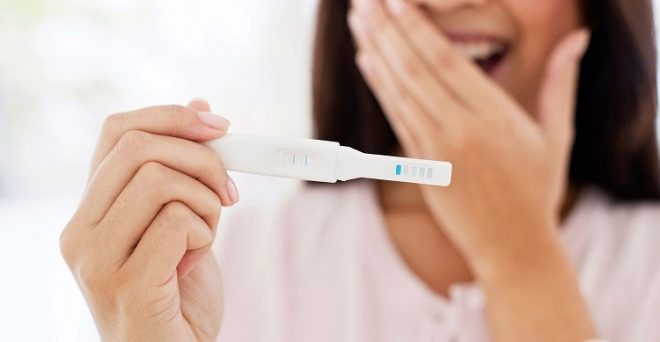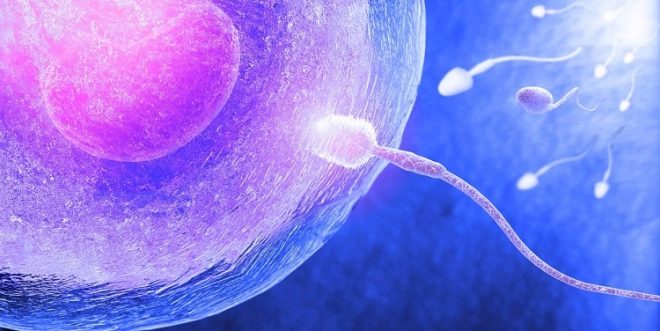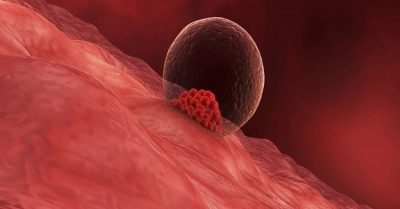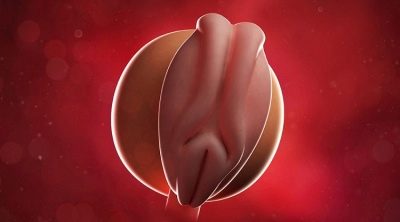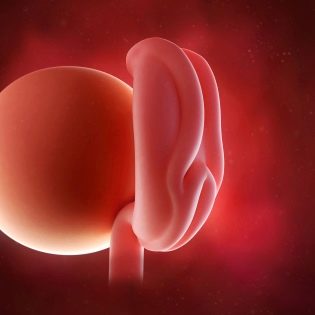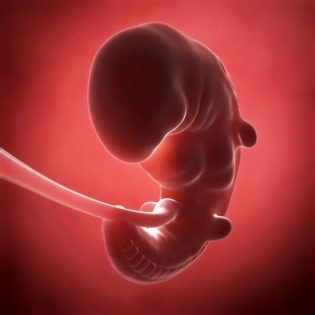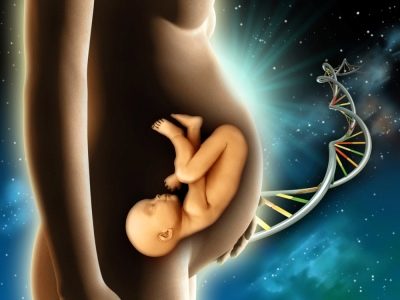First month of pregnancy
The first month of pregnancy without exaggeration can be called the most responsible and decisive. The main thing is determined - whether to be a child and how its development will begin. Very much depends on knowing what and how is happening in this period, and on the correct behavior of a woman.
general information
The first month of pregnancy can be considered the time from the conception of the crumbs, and then it will be the first embryonic month of its development. But in obstetrics it is customary to conduct all calculations in obstetric weeks from the first day of the last to conception of menstruation. In this way, The first month includes 4 lunar or 4.5 calendar weeks.
Need to know that first week of pregnancy corresponds to the week in which the woman still goes monthly. And 4.5 weeks is about 3-4 days since the start of the delay of the next menstruation.
Thus, the first month, many of the fair sex spend in the dark. But if the pregnancy is desired and planned, then the possibility of the existence of a baby, which until the end of 1 month will not be reliably confirmed, the woman will assume and behave more cautiously.
What happens to the baby?
The first month of pregnancy is not only the beginning of a new life, but also laying the foundation for its future well-being, because the probability of fertilization depends on the woman’s health and lifestyle. implantation, and the genetic set of DNA will determine right now everything that will be characteristic of a new inhabitant of planet Earth - gender, hair and eye color, skin, his inheritance from the ancestors of the disease and talents.
During the first month the formation of the fetus proceeds at an incredibly fast pace, and there is a process of organogenesis. The embryo is formed, but the feelings of the mother associated with the onset of pregnancy do not always begin this month.
In each female cycle, after the next menstruation, several follicles begin to mature in the female ovaries, but after a few days, the undisputed leader, the dominant follicle, is determined. That he will grow more active than others. The development of the rest will be stopped by special hormones that are produced during this phase of the cycle. The dominant follicle is torn and releases an egg cell that is mature and ready for fertilization. This happens in the second week of the cycle (in the second obstetric week of pregnancy). In most women, ovulation occurs on the 14-15 day cycle with a 28-day classic cycle..
The released egg is very lazy, inactive, and its viability is limited to just one day. If during this time the spermatozoa do not get to it, the female oocyte dies and the body gets rid of it in another two weeks during the new menstruation.
Sperm cells can wait for the oocyte in the genital tract, if sexual contact was before ovulation in 2-3 days, since male cells are more survivable. Sperm can have time to get to the egg on the day of ovulation, if the contact was directly on this day.
Of the tens of thousands of sperm wins one.He manages to break through the shell of the egg, after which it strengthens the shell so that other sperm cells cannot penetrate inside. They are no longer necessary, because an important process has begun inside the oocyte - the fusion of the nuclei of the cells of the father and mother. There is an exchange of genetic information. It is at these moments that it is decided who the child should be - a boy or a girl, whether he will be blond or brown, tall or short, where he will have birthmarks and whether he will have the talent to play the violin. At the same time, information is transmitted about genetic diseases, if the parents have them.
The egg cell loses its status and is now called a zygote. It begins to move smoothly down into the uterine cavity along the tube where fertilization took place. Her contribute to their vibrations of the villus of the fallopian tube.
A zygote is a single-celled organism that seeks to part with such status as quickly as possible - after 30 hours it divides into two, and after 10 hours - into 4 new cells. After a few days, the cells become 250, and so on. Having passed the morula stage, the embryo becomes round, resembling a blastocyst ball, the dimensions of which do not exceed 0.1 mm.
The third obstetric week of pregnancy corresponds only to the first week of embryonic development. Implantation is happening these days. 4-5 days after the momentous meeting of the oocyte and the sperm, the embryo descends into the uterus and floats there until a square of one of the walls sticks. It already has an inner layer, which is called the germinal node, and an outer layer, which will be responsible for implantation. The villi of the outer layer loosen the endometrium by the action of specific enzymes, endometrial cells are damaged, and the egg can plunge into the uterus. Villi immediately begin to feed the crumbs, connecting with the small blood vessels of the mother.
Almost immediately after the baby is fixed, intensive formation of embryonic structures will begin.. The baby acquires germinal petals from which the organs will be formed. By the end of the first month, the baby looks like a tiny dot with a rich inner world (naturally, at the cellular level). Its size by the end of the first month is no more than 1 mm.
From the very conception, progesterone is produced in large quantities in the body, which helps the endometrium become more lush and facilitate the implantation task. He is now in charge of many processes - it depends on the progesterone level whether the pregnancy will continue, whether the baby will have enough nutrition for development and growth.
Here are the milestones of the first month.
- Week 1 - menstruation is completed, the uterine cavity is cleared of the endometrium, which has grown in the last cycle and was not needed, since conception or implantation did not occur. The production of follicle-stimulating hormones begins.
- 2 week - the egg cell matures and leaves the follicle at the end of the week. Ovulation and conception occurs.
- 3 week - zygote, and then the morula and blastocyst descends into the uterine cavity. By the end of the week, implantation occurs, the embryo begins to receive nutrients and oxygen from the maternal blood.
- 4 week - amnion and chorion are formed. The first will become the fetal bladder, the second will gradually transform into the placenta. Germinal petals have appeared: the internal is to become the organs of digestion and urination, the middle is the basis of the heart and blood vessels, genitals, bones and muscles, and the external will become the skin of the child.
- 4.5 weeks - heart is actively formed. Of the two endocardial tubules, one is formed, the laying of the primary organ sections begins. It will take quite a bit - no more than a week, and the tiny heart, while the two-chamber, will begin to contract, beat. The laying of genital cells begins. A chord is formed, which divides the body into right and left sides, as well as a neural tube, which is destined to become the brain and spinal cord a little later.
Woman's well-being
The first obstetric week of pregnancy brings no new sensations to the woman’s life. Occurs for her usual menstrual bleeding, the uterus self-cleans, brings out the bloody fluid with particles of the rejected endometrium. Hormonal background remains normal, peculiar to the first phase of the female cycle, the norms of general blood and urine tests are not changed.
The second week precedes ovulation and ends with it. On the eve of ovulation, a woman may have a strong sexual desire - the mechanism of increasing libido is provided by nature itself when the woman is fertile, that is, she can conceive a new life.
Usually in the middle of a cycle, women experience the following ovulation signs.
- Discharge from the genitals becomes more abundant, viscous, the woman feels a constant sensation of moisture in the region of the external genital organs. Often, such consistency is compared to raw chicken protein by consistency - if you open your fingers, a string of threads will remain.
- Libido increases.
- At the time of the rupture of the follicle there can be quite distinguishable pain to the left or right of the lower abdomen, in the area of the ovaries.
- The basal temperature, which after menstruation was kept at 36.5 degrees, makes a sharp jump to 37.1-37.3 degrees.
- The sense of smell becomes aggravated, the breast slightly increases, its sensitivity increases. The reason for both is the change in hormones.
- There may be a slight bloating, because estrogens cause fluid retention in the body.
Planning a pregnancy is usually without significant difficulties determine in his ovulation. To the aid can always come test strips to determine ovulation, which can be bought at any pharmacy.
The third week passes either in complete ignorance or in an anxious waiting for the result.. The woman does not know whether the conception took place. But even if she would know about it for sure, consider yourself pregnant early, until the fertilized egg is successfully implanted in the uterus. This week this process is happening. This time by obstetricians is called the pre-implantation period.. A woman practically cannot increase the likelihood of implantation - there is no such medicine or behavioral technique that would help save a crumb in the size of half a millimeter if the female body does not take the baby.
At the end of the third week, the doubting woman begins to look for signs of possible implantation.
Signs of implantation
The opinion of the doctors on this subject is completely unequivocal: the implantation does not have any bright characteristic symptoms and signs. Everything that happens, happens on such a subtle, microscopic level that it is almost impossible to feel. But women themselves argue that this process can be fully sensed if the level of one's own sensitivity and receptivity allows (everything depends on the nervous system).
So, in the end of 3 - the beginning of the 4th obstetric week of pregnancy, the appearance of such signs is likely.
- Weak, aching back and lower back - pulling and breaking. Minor discomfort women tend to blame on fatigue, overwork, changing weather, etc.
- Low abdominal pain, as before menstruation. If a woman does not focus on her feelings, but is busy with work, study, something else, then she may not pay any attention to it at all.
- Temperatures may rise (slightly above 37.0 and mostly in the afternoon). The woman “burns” the face, there is a chill, or she is thrown from cold to heat - this is a side effect of a high level of progesterone, which is now “working” for the sake of food and preserving the life of the baby. Many at this stage believe that they have caught a cold somewhere. But in the morning the temperature returns to normal, and by the next evening it rises again, and so on until the very delay.
- A headache, slight dizziness may occur, drowsiness and weakness increase, women usually attribute this to fatigue.
- Often women say that on the day of implantation they felt an unpleasant metallic taste in their mouths, as if an iron coin was put under their tongues.
Normally, the discharge after ovulation becomes scarce, there is a so-called "dry" period. Therefore, the nature of the discharge will not tell you about anything concrete, unless implant bleeding occurs (according to statistics, it occurs in about 30% of women). To explain this mysterious phenomenon, medicine has been trying for a long time, but so far unsuccessfully.
Slight bleeding begins on the day of implantation.. Discharge scanty, scarlet blood does not happen, only a few drops of dark, close to brown color. At the physiological level, this is due to the violation of the integrity of the small capillaries of the endometrium in the process of dissolution of the shell cells with the villi of the ovum.
Bleeding is most often regarded as an implantation symptom only by those who have been waiting for this pregnancy for a long time and are savvy and well read about the symptoms and signs. The overwhelming majority of women believe that due to nerves or troubles at work, the cycle failed, so menstruations begin a week earlier than their due date. It does not confuse anyone normally, confuses another - After about a day, the sanitary pad becomes clean, there is no discharge. A week later, do not come monthly.
Implant bleeding is not dangerous for the mother and fetus. This is known for sure. If it does not occur, it also does not indicate any deviations.
After implantation, it begins to produce the hormone hCG. Every two days it doubles. Already 4-6 days after implantation (by the end of 4 obstetric weeks or several days before the delay), the earliest signs of pregnancy, caused by changes in hormonal levels, may theoretically appear.
Early symptoms of pregnancy
After implantation in the woman's body, the ratio of hormonal forces begins to change. Progesterone and chorionic gonadotropin (hCG) are predominant. The first is already present in large quantities, the second increases in the blood gradually, and it becomes noticeable for test strips in the urine only by the first day of delay (4 full obstetric weeks).
If ovulation was late or the implantation is somewhat delayed, then it is possible that the test will not give an accurate answer on the first day of the delay. More reliable is the blood test to determine the level of hCG (the hormone is produced by the fetal chorion villi). The blood is in a concentration distinguishable for laboratory methods as early as 3.5 obstetric weeks (3-4 days before the delay).
At the end of the first month of pregnancy, there may be no changes in state of health, and the earliest signs of an “interesting situation” may already appear - this is a purely individual question, it depends on the subtleties of the organization of the nervous system of a particular woman.
Progesterone, which has already completed the task of preparing the endometrium for implantation, takes on several other important functions - it starts retaining fluid in the body and promotes fat accumulation (nutritional reserve in case of hunger, provided for pregnant women by nature), also acts as an immunosuppressor - suppresses immunity women, so that the overly zealous immune cells do not reject the embryo, because it is only half of the native female body, the second half of its DNA is the father.
The changed hormonal conditions lead to the fact that the blood supply to the organs of the small pelvis becomes intense, and all the mucous membranes in the body become more friable. Therefore, a runny nose that may suddenly begin, or a general malaise, have a very reasonable explanation. If a woman does not feel anything, this is also a variant of the norm.
The most common signs of pregnancy that start in the first month, before or immediately after the delay, include the following situations.
- Drowsiness and fatigue - a woman feels overwhelmed due to reduced immunity and increased energy costs, which are required by the internal processes occurring with the baby and with her.
- Mood swings - side effects of progesterone are its effects on the psyche. Slightly suppressed the function of the central nervous system. Because of this, women have marked mood swings.
- "Pricking" and "lumbago" in the uterus and cervix are associated with relaxation of the uterine muscles, caused by the action of progesterone.
- New hormonal phenomena that have come into force may lead to an increase in the sensitivity of the nipples of the mammary glands. The chest increases slightly and sometimes even hurts. The stomach may be somewhat swollen, and progesterone often causes constipation or heartburn.
- Urination may become more frequent and uncontrollable excess drooling (usually in a dream) appears.
Feeling that the body "breaks" if it hurts the throat and the temperature exceeds 38.0 degrees - not a sign of pregnancy, but a sign of a real illness, flu or cold. Such there is a danger, because immunity, as mentioned above, is suppressed by progesterone.
The lumbar ache, pulls back - sensations are quite normal, so the body adapts to the new working conditions. A woman becomes more sensitive to odors. There were cases when a woman in an stuffy room lost consciousness in an early period only because her body was overloaded with the changes that had begun.
Some at the end of the first month begin to suffer from nausea and toxemia, which leads to the fact that the norms in the analyzes change - increased hematocrit, a large number of leukocytes, etc.
What can and cannot be done at this time?
In the first month of pregnancy, a woman can lead a normal life. Usually it happens, because many do not even know that they are pregnant. If a woman conceived and conceived in her heart suggests the possibility that she might be pregnant, then you should not commit those nonsense, which then you can regret.
Alcohol (even beer and wine) is not the best companion for healthy formation of fetal organs.. However, if you look at the situation from a medical point of view, then there is nothing terrible if a woman, not knowing about pregnancy, took alcohol during the first month (this is a rare and metered intake, and not a drunken use in large quantities every day). Until the 4th week of pregnancy, when chorion is formed, the baby will not feel the effect of alcohol at all, because it receives nothing from the mother's blood, feeds on the yolk sac.
After 4 weeks, when a woman sees two strips on the test, it is important to immediately give up smoking and alcohol, because at this time the embryo already receives a lot of substances from the maternal blood, and the placenta, which could be a barrier and protection, is not there yet - it has not formed .
The action of progesterone can cause marked emotional instability, mood changes, a sense of panic, but one should try to control oneself, get rid of stress properly, so as not to accumulate them into a state of chronic problem.
If the pregnancy occurred after the abolition of OC (oral contraceptives), there is nothing wrong with that. Contraceptive form does not affect the baby’s condition at 1 month of pregnancy, even if the woman took emergency contraception, but did it late or incorrectly, and the effect of the medicine did not come.
Sex is allowed to everyone except women who transferred embryo transfer to the uterus during the IVF treatment protocol. You can fly on an airplane without restrictions, if it does not cause discomfort. It is not prohibited to treat teeth yet, but it is already undesirable. - it is better to do this at the planning stage of pregnancy or to wait for the middle of the term, when both state of health will be better and the risks for the child will decrease.
The use of antibiotics during the first month of pregnancy is not prohibited, but is not encouraged. Donly the situation when the drug is prescribed by a doctor and taken with a disease that without the antibiotics can harm a woman even more. The risk of fetal development abnormalities against the background of antibiotics exists, but it is not as great as before, because antibiotics of a new generation have appeared, not all of them are teratogenic (harmful for the fetus).
The possible disorders of the work of the intestine against the background of the action of progesterone do not need medicinal treatment - it is enough to adjust the diet so that diarrhea or constipation recedes. If a woman was dieting and suddenly became pregnant, she found out when she had already passed the first month, you need to calm down and start eating right - balanced, increase the amount of vitamins and proteins.
As in the case of alcohol, your diet, even if you were on a strict diet to lose weight, and ate some lemons, is not dangerous for a baby before 4 weeks of gestation, until he began to receive nutrition from maternal blood.
Possible problems and ways to prevent them
This month, many problems, like the pregnancy itself, go unnoticed. So, during the confluence of the genital cells of the parents, genetic errors can occur, and then the chromosomal abnormality, not all of which are compatible with life, cannot be avoided. This is the most common reason why a pregnancy is not prolonged and for which the embryo dies after implantation for no apparent reason, it simply stops developing. In these situations, a woman begins her period, they just come after a short delay and can be a little more abundant than usual. A woman may not even know that she was pregnant.
Those chromosomal abnormalities that do not lead to the death of the embryo (Down syndrome and several others) have not yet been diagnosed - There is not a single way to find out whether the baby is healthy or not, at least until 10-12 weeks of pregnancy.
Implantation can take place not where nature intended it, but on the way to the uterus - in the tube or in the cervix after it enters the cavity. This is an ectopic pregnancy. At this period, it does not differ from the usual one, only the tests show the stripes a little later, and the blood test for hCG determines the reduced level of the hormone for the current period. It is too early to diagnose with ultrasound - the egg of the baby is too small to consider.
But there are signs that may cause suspicion. More often, an ectopic pregnancy develops in women who have taken drugs to stimulate ovulation for a long time, and have repeatedly performed abortions with inflammatory diseases of the pelvic organs.. Quite severe stabbing pains in the pelvis or abdomen may appear. In this case, the main symptomatic picture may appear already in the second month of pregnancy.
A frozen pregnancy occurs at such a short period mainly due to fetal genetic abnormalities, but the influence of harmful factors can also lead to the cessation of life activity and the development of the embryo. In this case, the fetus remains in the uterus for some time - from 2 to 4 weeks. Then the uterus rejects him like a miscarriage. A miscarriage during this period is usually not recognized and is taken as a delayed menstruation.
Due to a decrease in immunity, infectious diseases of both viral and bacterial origin are not excluded - angina, influenza, etc. Women with a tendency to constipation may develop or worsen hemorrhoids.
Recommendations
Tips for women are pretty simple.
- Lead the usual way of life, because pregnancy is not a pathology, not a disease, it does not oblige you to go to bed and spend all nine months in it.
- Try to get enough sleep - now you need at least 9 hours per day for a good night's rest.After two strips on the test, if your job is related to night shifts, ask your management to change your schedule due to your situation. They have no right to refuse.
- Add more vegetables and fruits to your diet. Give up strong coffee and tea, lots of sugar and chocolate. Now avoid allergenic foods.
- Walk and walk more.
- Tune in to good - your child is not yet able to feel your emotional state, but with hormonal blood, he perceives your stress hormones (adrenaline, cortisone, etc.).
With a sharp deterioration, pain, bleeding, fever, call an ambulance and try to wait for the medical team in the supine position.

